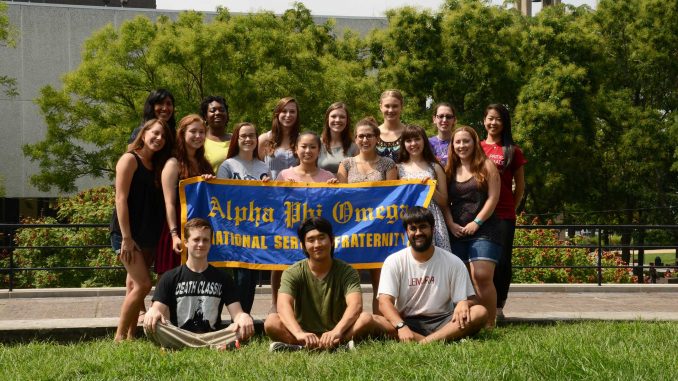
In Temple Greek life, it’s sometimes acceptable to call a woman a fraternity brother.
Being a fraternity brother doesn’t only refer to men these days, as the concept of co-ed fraternities has been introduced on campus.
Women interested in Temple Greek life are not only exploring sororities, but co-ed fraternities. With an increasing number of female students looking to join the Greek community, the opportunity to join co-ed fraternities provides more variety and opportunity to many aspiring Greeks.
Alpha Phi Omega is the largest collegiate fraternity in America. The organization has chapters established on more than 350 campuses in America, one of those being at Temple.
The fraternity was originally restricted to male members, but the board opened its gates to women in 1976 once the female college presence grew around the country.“
All of our members love that it’s co-ed. There is still a strong sense of brotherhood even though we’re not all men,” Temple APO President Kelly Sanford said. “The Zeta chapter at Stanford University was one of the first to accept women into their chapters in 1970. Other schools’ chapters started following in Stanford’s footsteps, and eventually the national office could no longer ignore the issue at hand.
In 1976, women could be nationally recognized as brothers of Alpha Phi Omega.
Sanford said APO’s acceptance of women into their brotherhood was a very proud moment.
“I believe that our chapter is very successful at Temple,” Sanford said. “If you want your organization to prosper, why not allow as many people to join as possible? I would never tell someone, male or female, that they are not welcome to volunteer or serve the community with us.”
Joining APO provides a multitude of volunteering experiences, but Sanford said there are many different opportunities and benefits that follow when one joins any organization on a college campus.
“Although we love service, I think that most of our members would agree that we love Alpha Phi Omega because of the bonds and friendships we make with our brothers,” Sanford said.
Although outsiders may think of Greek organizations as a pure social opportunity, they are also platforms for service and leadership.
The Alpha Phi Omega chapter at Temple strives to unite a goal and service-oriented group of students, according to members.
“Our goals are to continue serving the Philadelphia community and Temple University,” Sanford said. “We’re not a social fraternity, but a service fraternity, meaning we focus on volunteering.”
Even though APO takes pride in the work they do for the nearby community, Temple University Greek Association President Cori Shearer said there’s more to co-ed frats than volunteering. Alpha Phi Omega is technically not represented by TUGA since they are a co-ed fraternity.
“I personally believe co-ed organizations simply cater to a different type of student,” Shearer said. “Our organizations are single sex and came into existence due to the context of the history of our country. For example, sororities came into existence when women began attending college as a means of a support system. [The same goes] for cultural-based organizations.”
Whether one’s motivation for joining a Greek organization is purely social, purely for volunteering, or a bit of both, Temple Greek presidents have said there are multiple benefits to belonging to a Greek organization at Temple.
With Rush Week approaching, prospective Greek members have some time to decide if they want to rush and what type of organization best fits their personal goals.
Mary Smith can be reached at mary.smith@temple.edu.



That is a load of bs I’m a member of alpha phi Omega nad I pledged a noncoed chapter and I will never be in one